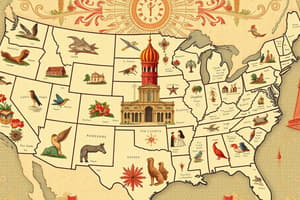Podcast
Questions and Answers
What is a state?
What is a state?
A form of governmental organization characterized by centralized power and the enactment of legislation.
How do states differ from local governments?
How do states differ from local governments?
States have their own constitutions, bicameral legislatures, and executive branches.
What does statehood refer to?
What does statehood refer to?
The recognition of a region as a sovereign entity.
How does statehood relate to stability?
How does statehood relate to stability?
What were states historically associated with?
What were states historically associated with?
What is one example of a country with states?
What is one example of a country with states?
Study Notes
A state is a form of governmental organization characterized by a centralized power that governs its population through the enactment of legislation and maintenance of public order. In contrast to local governments, states have their own constitutions, bicameral legislatures, and executive branches.
The term can also refer to the political division of a country into parts. For example, the United States consists of 50 states, each with its own constitution and government structure. These states have various forms of government, including republics, constitutional monarchies, and federal systems.
Statehood refers to the recognition of a region as a sovereign entity, often after a declaration of independence from another nation. Statehood comes with certain rights and responsibilities, such as the ability to enter international agreements and maintain diplomatic relations with other nations. It is granted to entities based on their demonstration of stability, security, and capacity to meet international obligations.
Historically, states have been associated with feudalism, where territories were divided among nobles who ruled over them according to customary law, rather than a written code of laws like those found in modern states. Over time, however, these feudal arrangements evolved into more centralized forms of government, characterized by increased bureaucracy and control from a central authority.
In the context of computer science, a state can refer to different meanings depending on the field. In databases, it is a set of values attributed to an object, defining how it will behave and interact with other objects. In programming languages, a state machine defines a computational model used in software design and visualization tools.
Overall, the concept of a state encompasses a range of meanings related to government, geography, and technology. Understanding the nuances of these definitions is crucial for navigating discussions around politics, policy, and technological development.
Studying That Suits You
Use AI to generate personalized quizzes and flashcards to suit your learning preferences.
Description
Explore the multifaceted concept of 'state', encompassing governmental organization, political divisions, statehood, and its various interpretations in different fields like computer science. Delve into the historical evolution of states from feudal territories to modern centralized governments.




